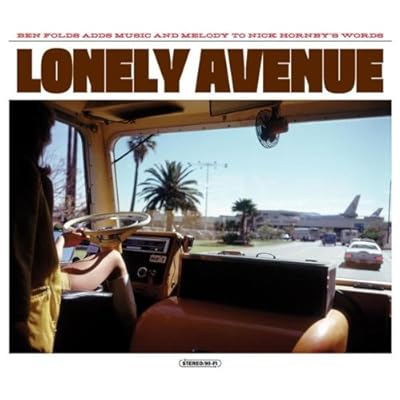
Music review time. I recently acquired the new collaboration between Ben Folds and Nick Hornby, an album called Lonely Avenue. It has a different feel than previous BF releases, but that's a given as it's a collab. Still absolutely worth a listen.
I'm assuming most readers know who Ben Folds is. He has been releasing records for the last fifteen years, some under the moniker Ben Folds Five and later on a few solo albums. He has gained a niche among college-aged and young adults with his heinously catchy melodies and heartbreaking lyrics. And he is a whirlwind live performer. If you ever have the chance to see him, TAKE IT. It will be one hell of a show.
Nick Hornby is an artist not generally corollated with writing music. He has written about music his entire career as a writer, but this is his first instance of actually collaborating on a musical album. He is most well known for writing several popular novels, including High Fidelity, About A Boy, and Juliet, Naked, as well as the screenplay for the 2009 movie An Education, which was nominated for the Academy Award for Best Original Screenplay. So the dude's got chops. I am not in love with every single thing he's ever done, but on the other hand some of his work is the best written material I've ever read. This guy knows how to pierce your heart through writing about normal people with real problems. He can capture dialogue so incredibly well and make you feel heartache you've never had.
So how do these two collaborate on an album of music? Hornby writes words, Folds writes lyrics. Sounds weird but potentially awesome. And in my opinion, it turns out to be mostly awesome. The interesting part is that it clearly sounds like a Ben Folds album, but the disconnect happens as he starts to sing. The lyrics are not Ben Folds lyrics, and you can tell. It feels more like a Nick Hornby book than a Ben Folds album. And on some songs that's amazing, some it doesn't completely work. I don't think Hornby has his complete songwriting chops down yet, like on songs like Your Dogs and Picture Window. The songs have great feelings communicated but they don't feel natural to me. And that's just me. The majority of the album works great. And I think the biggest reason it's great is because they chose the perfect pairing of artists. Nobody could've pulled this album off but Ben Folds. His music is the ideal vehicle for Horby's writing. Hornby writes in such a familiar way, with stories about real people, and that's how Ben Folds has always written his music. It doesn't feel totally like a Ben Folds album, but it's as close as you can get. And the off-kilter feeling you get isn't bad, it's just not totally Ben Folds.
One of the best examples is the song Password. It uses a really unique songwriting device, spelling of words, and at first listen it seems a little cheesy, but after a few listens and the songs sinks in, holy cow it just rips you apart. You stop listening to the spelling of the words and you feel the pain in the narrator. That is unique and weird songwriting. But it's awesome. The song changes gradually the more you listen to it.
Final verdict? Great album. Not the best Ben Folds album ever but that's because it's not purebred Ben Folds. What it is is a great listen for fans of either artist.
-Jon
P.S. The album comes with killer liner notes. A quick blurb written by Hornby about each song, and then four different short stories written by him as well. Super great. Cool photos too.